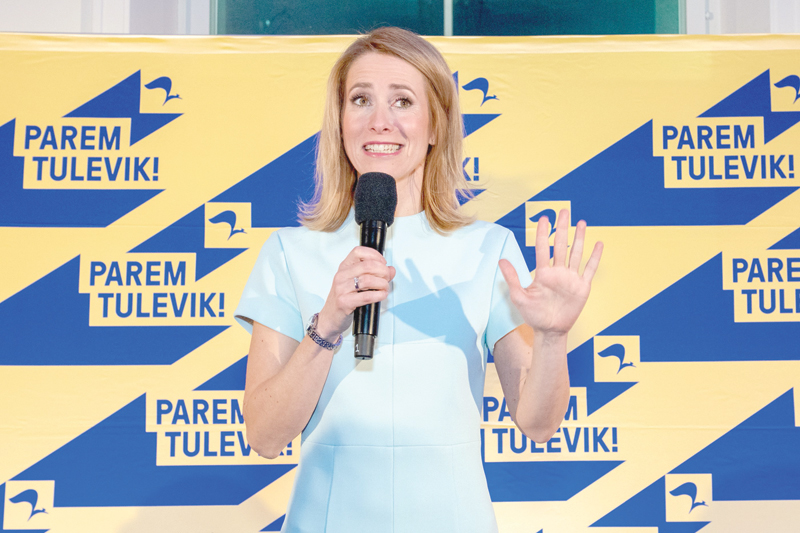

Tallinn: Estonia was on track on Monday for its first female prime minister after the opposition liberal Reform party won a general election, outpacing the governing centre-left and a surging far-right party buoyed by a backlash from mostly rural voters in the Baltic euro zone state.
Reform leader Kaja Kallas, a 41-year-old lawyer and former MEP, wooed voters with business-friendly promises of cutting taxes and unemployment insurance premiums to aid job creation.
Bread-and-butter issues like taxation and public spending dominated Sunday’s election in the ex-Soviet EU and Nato state, along with tensions over Russian-language education for the sizeable Russian minority and the rural-urban divide.
Reform garnered 28.8 per cent of the vote, ahead of the governing centre-left Centre party with 23 per cent, while the far-right EKRE more than doubled its previous election score with 17.8 per cent, according to full results on Estonia’s official election website.
Turnout was just over 63 per cent.
A staunch europhile, Kallas is the daughter of former Estonian prime minister Siim Kallas, who also led the Reform party before serving as a European transport commissioner.
Should she succeed in putting together a viable coalition, Kallas will govern in tandem with President Kirsti Kaljulaid, Estonia’s first female head of state who took office in 2016.
Vowing to “put together the government and start running the country with common sense”, Kallas said Reform would consider coalitions with three of the four other parties that entered parliament, ruling out EKRE as “not a choice for us”.
She said Reform has “strong differences” with the Centre party of outgoing Prime Minister Juri Ratas in three areas: taxation, citizenship, and education.
Asked if his party would consider becoming a junior coalition partner, Ratas said “of course” but declined to elaborate.
Holding a combined 60 seats in the 101-seat parliament, the two could govern together as they have done in the past.
Centre and Reform have alternated in government over the nearly three decades since Estonia broke free from the crumbling Soviet Union.
Both strongly support Estonia’s EU and Nato membership, which they see as a buffer against Soviet-era master Russia.
They have favoured austerity to keep spending in check, giving the country the euro zone’s lowest debt-to-GDP ratio.
Centre had vowed to hike pensions by 8.4 per cent and to replace Estonia’s 20 per cent flat income tax and 21 per cent corporate tax with a progressive system to boost state revenue.
Joblessness hovers at just under five per cent while economic growth is expected to slow to 2.7 per cent this year from 3.9 per cent in 2018.
Kallas could also woo two other parties which currently govern in a coalition with Ratas — the Social Democrats and the conservative Isamaa — for a 56-seat majority.
While it won just seven seats in the 2015 election, EKRE is now a close third behind the mainstream parties after capturing support on promises of slashing income and excise taxes and pushing anti-immigration rhetoric.
Experts say its appeal is largely rooted in the misgivings of rural Estonians who feel left behind after years of austerity under Centre and Reform.
Staunchly eurosceptic, the party has called for an “Estxit” referendum on Estonia’s EU membership, although the move would fail in the overwhelmingly pro-EU country.
The party’s suspicion of Moscow translates into strong support for NATO membership and the multinational battalion the alliance installed in Estonia in 2017 as a tripwire against possible Russian adventurism.
Tonis Saarts, a Tallinn University political scientist, described the EKRE’s position on liberal democracy, including civic and human rights, rule of law and the separation of powers, as “very ambiguous” and compared it to similar parties that have recently gained support across Europe. — AFP
Oman Observer is now on the WhatsApp channel. Click here



